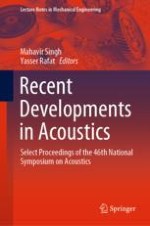2021 | OriginalPaper | Buchkapitel
Acoustic Analysis of Voice of Temple Priests
verfasst von : V. Priyadharshini, M. Vasupradaa, K. Yeshoda
Erschienen in: Recent Developments in Acoustics
Verlag: Springer Singapore
Aktivieren Sie unsere intelligente Suche, um passende Fachinhalte oder Patente zu finden.
Wählen Sie Textabschnitte aus um mit Künstlicher Intelligenz passenden Patente zu finden. powered by
Markieren Sie Textabschnitte, um KI-gestützt weitere passende Inhalte zu finden. powered by
Abstract
-
To investigate variations in acoustic measures across different tasks (reading, monologue, and chanting).
